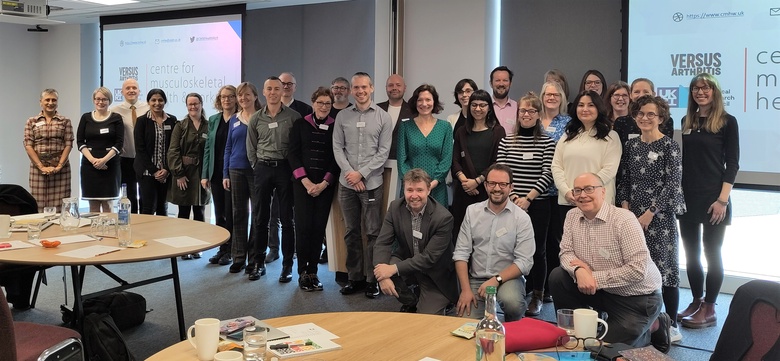- Centre for Musculoskeletal Health and Work (CMHW)
-

Who’s in the team?
The Centre for Musculoskeletal Health and Work (CMHW), co-funded by Versus Arthritis and the Medical Research Council, is a cross-institution collaboration led by the University of Aberdeen and involving nine partner institutions across the UK: Guy’s and St Thomas’ NHS Foundation Trust, Keele University, King’s College London, Lancaster University, Liverpool John Moores University, University of Manchester, University of Salford and University of Southampton.
At Aberdeen our team is led by Centre Director Professor Gary Macfarlane, with coordination provided by Centre Manager Stuart Anderson. Our local co-investigators include Dr Rosemary Hollick, Professor Gareth Jones, and Dr Elaine Wainwright, with research members Dr Cara Ghiglieri, Dr LaKrista Morton, Dr Martin Stevens and Dr Lili Xu completing the Aberdeen team. Overall, the Centre comprises 35 affiliated staff members.
What do you do?
The Centre has a core remit to to undertake research which informs policy to minimise the adverse impacts of musculoskeletal (MSK) conditions on work for the benefit of workers, patients, employers and society at large. In practice this encompasses a wide range of studies covering subjects as diverse as developing and testing work support interventions, producing a consistent set of outcome measures for work and health research, assessing incentives for employers to invest in work support and adjustments and support mechanisms for disabled entrepreneurs. Our research incorporates a broad variety of study designs including epidemiology, randomised controlled trials, qualitative studies and mixed-methods research.
Why is it important?
An estimated 1 in 10 employees in the UK live with an inflammatory or non-inflammatory MSK condition. They are one of the leading causes of lost productivity due to ill health, with over 23 million work days lost per year, at an estimated annual cost to the UK economy of £2.58bn (set to rise to £3.43bn by 2030). From an individual perspective, we also know that being in work (especially ‘good work’) provides a range of physical and psychological benefits.
There are particularly worrying trends post-pandemic: there is a rise in economic inactivity amongst people aged 50+ (people who are not in employment and not looking for work), with these people taking with them valuable skills and expertise vital for the UK’s economy, and musculoskeletal conditions (including chronic pain) are thought to be important drivers of this trend. At the other end of the age range, there has also been a recent decline in employment and economic activity rates for 16-24 year olds.
Our work seeks to support people with a musculoskeletal condition to enable them to remain in work, should they wish to do so, throughout their working life.
What are some of your big projects right now?
As we move into the second phase of our seven-year funding programme, the emphasis is now firmly on maximising the impact from our research work.
The QUICK study has been engaged with designing a new questionnaire tool which captures a broad range of work impacts of chronic pain, and takes account of the modern ways people work (using platforms, multiple jobs etc). Our questionnaire is currently undergoing final evaluation and will be ready in Spring 2024, and we plan to then quantify these impacts across a broad range of people in different types of work.
Making it Work™ – Scotland is a Chief Scientist Office (CSO) funded programme which seeks to support workers with MSK conditions to remain in work, specifically addressing issues that they see as barriers to continuing to work (such as managing fatigue, requesting work modifications, etc). The project team is currently developing an online support programme which will be ready by mid-2024.
We have also recently secured NIHR funding via their Work and Health Programme Development Grants to further support translating our work for the benefit or patients: this includes impact development from Centre projects about how best to manage arm pain, how to identify people with chronic pain who are likely to need to take time of work (so that support can be targeted to them), and increasing the reach and uptake of programme to aid young people with MSK conditions to make the transition to higher and further education, and on to employment.
Any other key takeaways about your team?
The area in which we are working is now a key priority for the UK Government and we have been spending a lot of time working with civil servants from the Departments for Work and Pensions and Health and Social Care to make sure they know about our work and how it can fit into their policy plans.
What’s the best thing about being part of your team?
CMHW is a truly cross-disciplinary research collaboration, with all participants able to call on the expertise of a host of personnel with their own specialities, strengths and expertise, including leading figures in the field of MSK health and work. Our strength lies in the breadth of our collaboration, and ongoing conversations between participating institutions ensure we are able to mutually support one another, and ultimately come together so that the Centre is more than the sum of its parts.
